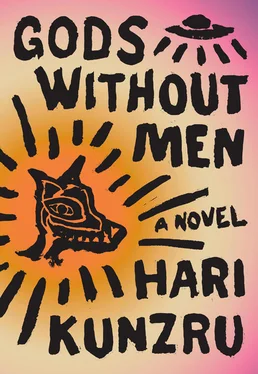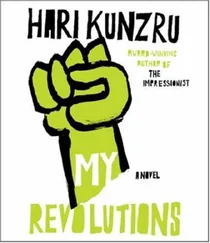“For God’s sake, shut up! I don’t want to talk about it. And it’s not appropriate in front of him.”
She scooped Raj up and half dragged him into the bathroom, slamming the door behind her. Once inside, she sat on the toilet with the lid down, hugging him tightly. He complained a little, tried to squirm out of her grasp. Jaz knocked tentatively on the door.
“Go away,” she called out. “Just go away. He’s back. Why isn’t that good enough for you?”
Of course she had the same questions. Where had he slept? What had he eaten? What was the first thing he saw when he woke up in the morning? Did they touch him, bathe him, smooth his hair? Was there one person? Two? There must, she thought, have been a woman. A couple. What was that woman thinking when she unbuckled him from his stroller and ran with him down the dusty path? Was she desperate? Angry? Insane? Each question bred more, doubling, quadrupling, a vertiginous recess of uncertainty. The only way to deal with such a pit of questions was to close the trapdoor, to refuse to look down. That was what Jaz didn’t understand. God had given their son back to them. It ought to be enough.
When the job came up at Paracelsus Press, she’d not taken it seriously. The offer came through Paula, one of the other women in the group. She was a nutritionist, friends with Karl, the publisher. They were looking for an editor. She’d immediately thought of Lisa. Instinctively Lisa found herself saying that it didn’t really sound like it was for her. Paula looked mystified. Why ever not? She’d have thought it was a perfect fit. Lisa looked through the list, and, among the titles on color therapy and dowsing, found a lot of books that were serious and considered. She was curious enough to set up an interview. Karl turned out to be a typical Lower East Side character, a rakish old communard with a graying ponytail and a little ebony stud in his left ear. He’d started off in the underground press, branching out into book publishing when the dream of a revolution in consciousness began to subside in the mid-seventies. He’d run Paracelsus out of his apartment for many years, but with the Internet (a miracle, he said, a boon) it had rapidly grown into one of the leaders in its sector. They’d had hits with an Iyengar yoga manual and an illustrated version of the Bardo Thodol, and he wanted to plow the money back into the business. Over a meal at a raw-food restaurant in the East Village, he told her he was looking for someone to work on a series about world religion, a collection of the mystical texts of the great traditions presented in a way that was neither too popular nor too scholarly, a route for general readers into the various intersecting currents of faith. She could work out of their offices on Ninth Street. She said yes straightaway.
Jaz sneered. If she wanted a job, why couldn’t she find one with a serious publisher? That word. One of Jaz’s words, like reasonable, rational, pragmatic . He read out titles in a scoffing voice. The Solar Seal: A Manual for Lightworkers. UFOs and the Manifestation of Spirit . Was that really the sort of crap she wanted to foist on the world? Sure, she admitted, some of their titles were aimed at a fringe audience. But she was going to be working on something substantial, something she really cared about. He could say what he liked, but she wasn’t going to be embarrassed anymore about what she believed.
“And what do you believe?”
“That my son was returned to me. And that I owe a debt.”
“To who? To the police? The people who found him?”
“I can’t talk about this with you.”
“Because it doesn’t make sense.”
“I know what happened. I kept my faith with Raj and he came back to me.”
“Lisa, you were catatonic. Suicidal. You told me you knew he was dead.”
“But he came back.”
“You don’t even remember. I thought — look, the idea that Raj was found because of your magical thinking is — you know it’s insane, right?”
“So because I want to do something more than sit in my own filth, eating chips and making up conspiracy theories, I’m insane?”
“Conspiracy theories?”
And so it went on. It was tiring, desperately tiring, but eventually he agreed. He didn’t want to work and she did. They had enough money. He’d look after Raj during the day when she was at the office. She hoped it would bring him closer to the boy. She was happy when she heard about the walks. It seemed healthy. A father-and-son thing. She had no idea they went so far, until one day she looked at the wheels of the stroller. They’d been worn down almost to the metal.
The job was absorbing, though she was glad she didn’t need to live off her meager paycheck. Her first commission was a book on Tibetan Buddhism, to be written by a Rinpoche in California, an American who’d studied for many years in the Himalayas. Karl was already pressing her to start work on the second volume, about medieval Christian mystics. She enjoyed being around him, working amid the heaps of papers in the little office, listening as he chatted to Teri, the other editor, and Mei Lin, who did the books. Karl was quickly becoming almost as important an influence as Esther. She grew to look forward to their one-on-one conversations, the lunch meetings over Thai or Japanese food, the sandwiches from the local vegan café. Karl was a positive force. It was his own description, but when you got to know him, it didn’t seem arrogant, just a statement of fact. He meditated. He rode a track bike. He brewed his own kombucha, scary-looking fungal cultures housed in mason jars in the office storeroom. He was enthusiastic about the history and landscape of East Asia, particularly Laos and Cambodia, which he described in passionate detail. Though he was much older than her, in (she guessed) his sixties, his body was lean and wiry. She began to wonder, idly, what it would be like to hold him, to run her hands over his thighs, his chest.
She felt as if she’d turned a corner. Every day her life seemed to get a little better. When Raj started to talk, she told her colleagues it was an affirmation, proof that they were all protected by a higher power. At the book group she and Esther and the others said prayers of thanks. She began to allow her imagination to range further. Raj was — it didn’t seem too much to use the word — a miracle. Every day he seemed to achieve something new. With a learning curve (even the doctors said this) so much steeper than normal, anything was possible. He might even turn out to be a genius, an extraordinary mind that had started life locked away from the rest of the world. She wrote off for school prospectuses, scrutinized entry requirements for gifted and talented programs. Only Jaz seemed untouched by the new possibilities. He winced when she voiced her (perfectly reasonable) wish that he be tested by an educational psychologist, to prepare him for entry to one of the elite elementary schools in the city. That (of course) provoked another fight. Why couldn’t he give thanks, like she did? Where was his joy? He told her he didn’t give a damn about being “out of touch with his light” and stormed out of the house. He didn’t come back until late that evening. He smelled sour, like stale red wine. She assumed he’d been sulking in some bar.
At other times they were united. Their friends came back. A few, at least. There were some she couldn’t forgive, others who still seemed alienated by the drama of the previous year. But there were the beginnings of a social life. They found a babysitter in the neighborhood and experimentally went out to dinner, leaving Raj in her care. It was a success. They began to buy listings magazines, looking at what was on in the city. Amy came to stay, with her new boyfriend, a very nice Nigerian doctor. Lisa cooked a dinner party, invited Esther and Ralph and another couple. Before they sat down to eat, she asked everyone to join her in a short prayer. Jaz looked stricken. The others understood. At the end, Adé boomed out a loud amen.
Читать дальше












